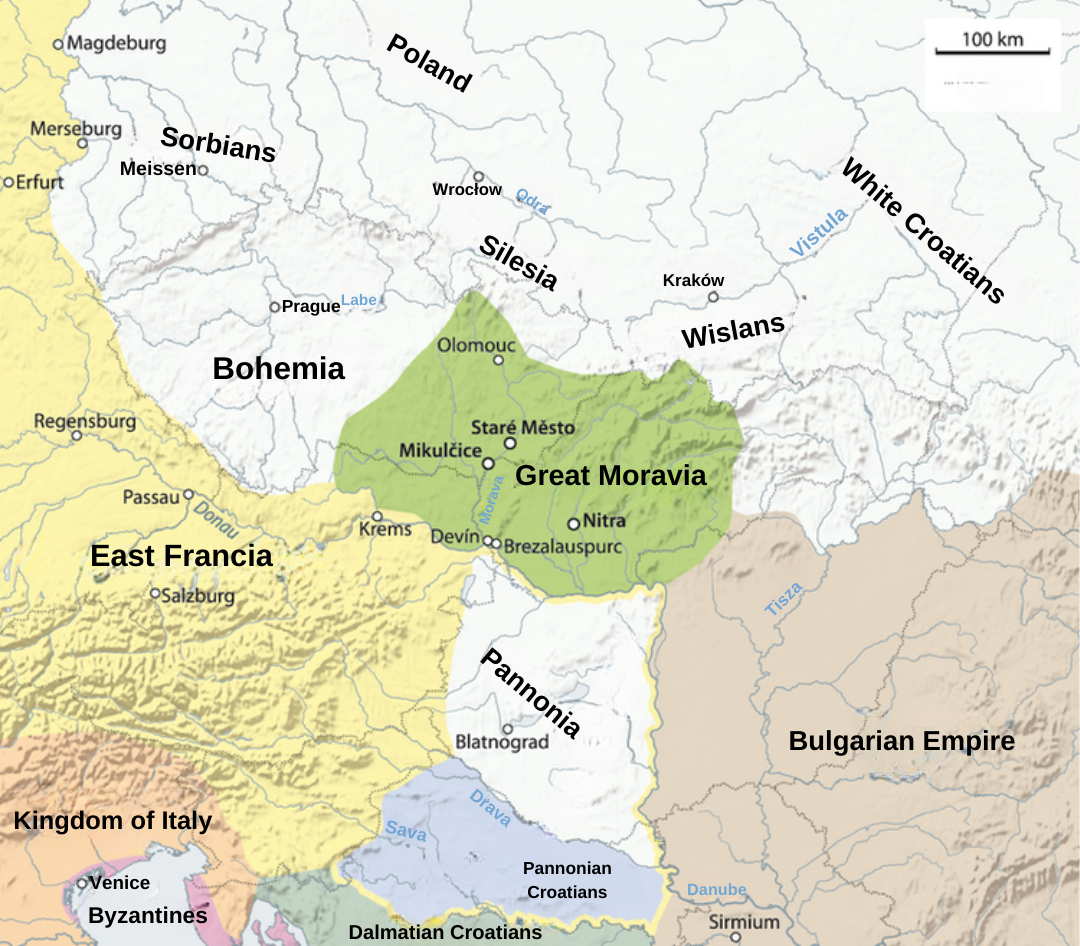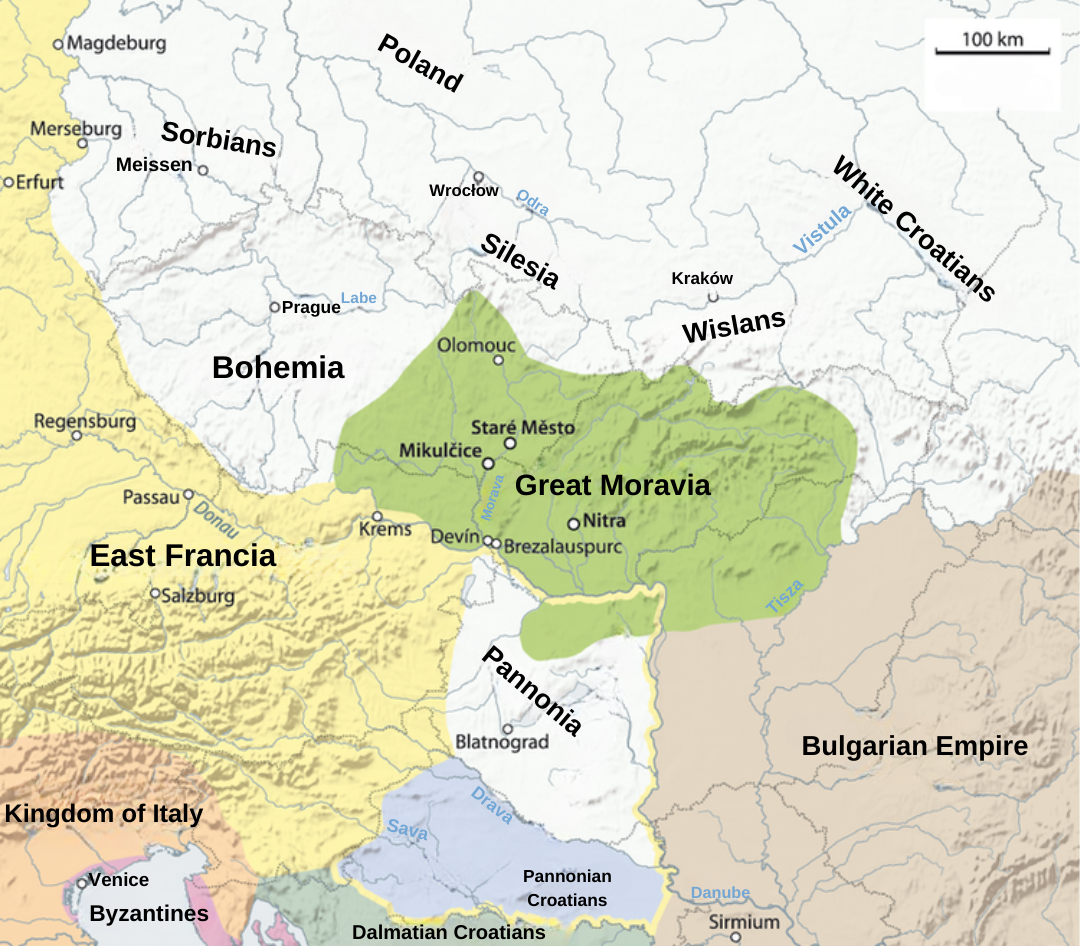History of Great Moravia
Mojmir I (830-846):
Great Moravia during the reign of Mojmir I
Along the Morava River in the modern Czech Republic, a powerful country once stood that was the first major West Slavic state: Great Moravia. The country was founded in 830 by Mojmir I, who would go on to also be the founder of the Moymirid dynasty. Originally, the Czech and Moravians were conquered by Charlemagne, but the Frankish wars with the Avar Khaganate provided the Mojmir I with an opportunity to win great power and wealth that allowed him to transform Great Moravia from its tribal origins into a country that resembled Charlemagne’s Carolingian Empire and converted to Christianity. The death of Charlemagne’s successor threw the Carolingian Empire into civil war, which further allowed Great Moravia to grow and break free from Frankish control. However, the Treaty of Verdun in 843 put an end to the civil war and placed Louis the German in control of East Francia. The new ruler declared war on Great Moravia, aiming to depose Mojmir I and replace him with Rostislav, Mojmir’s nephew, believing him to be potentially more loyal of a subject. Mojmir I lost the war and was successfully deposed in 846.
Rostislav (846-869):
Great Moravia during the reign of Rostislav
As the new king, Rostislav used his initial good relationship with Louis the German as his vassal to continue consolidating Great Moravia’s strength and territorial size. By 855, Rostislav had accumulated enough power to break free from East Francia and successfully defend his land. During this time Rostislav requested aid from either the Pope or the Byzantines in spreading Christianity throughout his realm. From the Pope, Rostislav received no answer; however, in 863 he did receive an answer from the Byzantines when the brothers Cyril and Methodius (the famous “Apostle of the Slavs) were sent to Great Moravia. During their time in Great Moravia, Cyril and Methodius created the Glagolitic alphabet in order to translate important Christian liturgy into Slavonic texts, which would later create strife between the brothers and the Pope in Rome. A year later in 864, Rostislav’s conflict with Louis the German reached its peak and though Rostislav stood his ground at Devin, the war had weakened Great Moravia significantly. Rostislav’s nephew, Svatopluk, brokered a separate peace deal with the Franks, along with his Bohemian allies. Rostislav was angered by this betrayal and sought to have him killed, but Svatopluk in turn seized Rostislav and turned him over to the Franks. Despite Svatopluk doing this, he would not succeed Rostislav as king, for the Franks imprisoned Svatopluk in 870 under the accusation of treason.
Slavomir (870):
The Moravians revolted in response to the imprisonment, electing a Moymirid priest named Slavomir as their king. The Franks released Svatopluk and gave him an army, expecting him to use the army to march back to Great Moravian to start a civil war and reclaim his authority. However, upon reaching the Moravian territory, he immediately turned against the Franks and sided with the Moravians. Slavomir stepped down as king and Svatopluk took his place as the rightful king of Great Moravia in 870, waging war with the Frankish empire. Eventually, Svatopluk chose to make peace with the Franks, knowing he could not resist forever, and swore allegiance to them in exchange for autonomy. Thus, began the reign of Svatopluk the Great and the apex of Great Moravia’s power.
Svatopluk the Great (870-894):
Great Moravia during the reign of Svatopluk the Great
At peace with the Empire of the Franks and free to do as he pleased, Svatopluk made a large territorial push into all the surrounding territories between 874 and 883, conquering lands such as Bohemia, Pannonia, Slovakia, Silesia, Lusatia, and others. Throughout his conquests, he made an effort to convert all the pagans to Christianity as part of his justification for conquest. Initially, Methodius was made Archbishop of Moravia and helped in this field, but he was eventually replaced by the Bishop of Nitra, Wiching. All of this also served as a means of placing Great Moravia under the Pope instead of the Franks. In Bohemia, Svatopluk placed Premysl Borivoj in charge, who was destined to found the Premyslids of Bohemia. These conquests would be the extent of Great Moravia’s expansion, as by 892 and 893, strife between Svatopluk and King Arnulf in East Francia would spark a war. Svatopluk once again stood his ground against the Franks, but his death in 894 spelled doom for Great Moravia.
Mojmir II (894-906):
In 894 following Svatopluk’s death, his son Mojmir II assumed the throne of Great Moravia. Mojmir II did not have the strength of character that Svatopluk had to keep the nation together, and soon the tribes on the borders began to break away. The arrival of the Magyars in the Carpathian Basin proved dire for Great Moravia’s situation, as the Magyars sought to conquer their land. Despite making peace with King Arnulf and the Magyars, Arnulf’s death in 899 led to Magyar expansion and war. Great Moravia and the Bavarians joined forces to combat the Magyar, but in 906 Mojmir II fell in battle during the confrontation, and the Bavarians were later struck down in 907. These two defeats put an end to both the Moymirid dynasty and Great Moravia, as all that made them “great” was lost.






